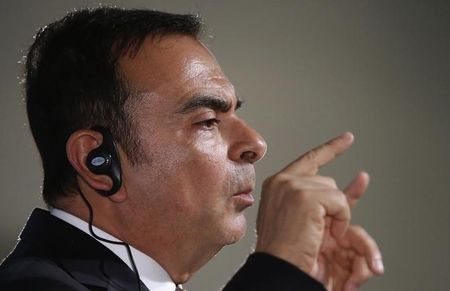By Yoko Kubota and Ritsuko Ando
TOKYO (Reuters) - Nissan Motor Co Chief Executive Carlos Ghosn raised doubts over Japanese Prime Minister Shinzo Abe's call to appoint women to 30 percent of top jobs by 2020, saying rushing to meet such a target could set the firm and its staff up for failure.
Abe issued his call as part of a strategy to encourage more women to work in the world's third-biggest economy, replenishing Japan's dwindling workforce in a rapidly ageing population. Yet with women now filling just 1 percent of corporate executive committee jobs, the target is ambitious.
Scepticism from Ghosn, a Brazil-born French citizen of Lebanese origin considered one of the more progressive executives in the country, echoes resistance among Japan's more tradition-bound business leaders to the 30 percent target. Ghosn said aiming for 10 percent by end-March 2017 was a more realistic goal for Nissan, where women now fill around 7 percent of management positions.
"Frankly, what I don't want is a burst of females in management with a lot of failures," Ghosn told a news conference in Tokyo on Thursday, when asked about the 30 percent target. "We need to show successes. If people start to see ... failures, I think it's going to be counter-productive."
Abe has vigorously talked up the potential for women to contribute more to Japan's economy in line with his administrations reforms to stoke growth dubbed 'Abenomics'. But his pledge at the Davos World Economic Forum in January that women would occupy 30 percent of leading jobs in Japan by 2020 is lofty: Women now account for only 11 percent of mid-to-senior management and just 1 percent of executive committee members, according to McKinsey.
The number of women in management positions at Nissan is well ahead of many Japanese auto makers. Around 1 percent of managers at rivals Toyota Motor Corp and Honda Motor Co are women.
"I totally understand and support the Japanese government's efforts to promote women in society. Obviously the Japanese government has a lot of objective reasons to do that," Ghosn said. "But I think 30 percent is ambitious."
Japan's top business lobby, Keidanren, opposes across-the-board targets and has said companies should adopt their own individual strategies to promote more women.
The government has said it will pave the way by promoting more female civil servants, and Abe has suggested that companies start out by appointing at least one female executive.
Economics Minister Akira Amari, however, recently told Reuters that he wasn't keen to force numerical quotas, even in government positions. "If there aren't the right people but you force it, the means become the target," he said.
Not all are against targets, however. One of the most senior female executives in Japan's financial industry, Keiko Tashiro, a Daiwa Securities Group executive managing director and head of the brokerage's Americas business, said in a recent interview with Reuters she was hopeful they could prompt more debate among companies.
Tashiro was among the first university graduates to enter the work force after Japan's parliament first passed equal employment opportunity law in 1985. She said she now sees a gap between companies who have since made a real effort to boost career opportunities for women and those who haven't.

"I think targets are, to some extent, necessary," she said. "There should be more discussions over why such targets are necessary, and there must be more debate about how such targets can be achieved."
(Additional reporting by Minami Funakoshi; Editing by Kenneth Maxwell)
